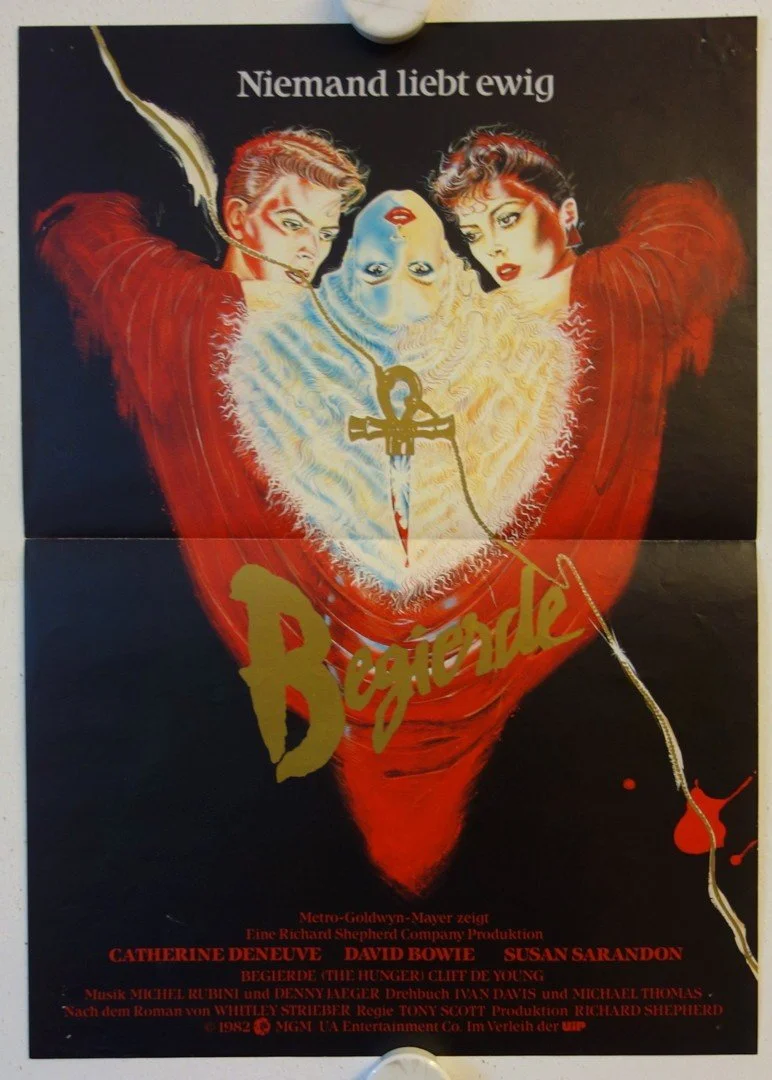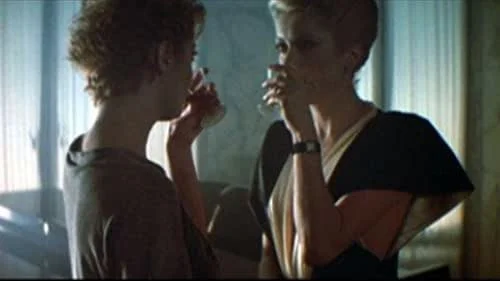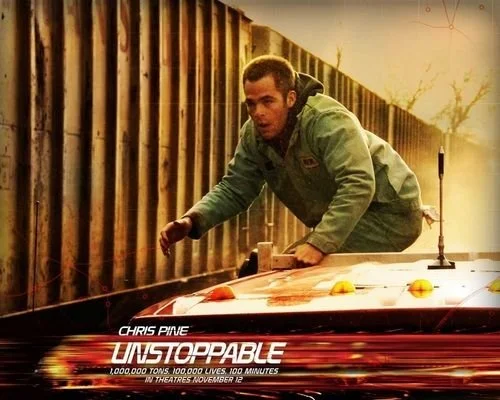Tony Scott's Directorial Career Began and Ended Strongly With 1983's The Hunger and 2010's Unstoppable
Tony Scott was part of a wave of young English directors in the early 1980s who emerged from the glossy world of commercials and music videos and never quite lost that aesthetic even as they became phenomenally successful filmmakers. Along with like-minded visual stylists Adrian Lyne, Alan Parker, and Russell Mulcahy, Scott brought the rapid-cut, surface-obsessed sensibility of MTV to the big screen, forever blurring the lines separating commercials and feature films, entertainment and commerce.
Scott made his directorial debut with the cocaine-chilly 1983 vampire erotic thriller The Hunger, which would be a perfect The Man Who Fell to Earth-like vehicle for star David Bowie if he didn’t leave the proceedings halfway through. Not even Catherine Deneuve and Susan Sarandon at the height of their iconic beauty can make you completely forget when David Bowie departs what should be a David Bowie movie, not just a movie that initially makes very wise, and then very bad, use of Bowie’s extraordinary talent and presence.
Adapted from a novel by Whitley Schreiber, The Hunger follows the ennui-drenched, angst-ridden, slow-motion adventures of Miriam and John Blaylock, a pair of old-world vampires played by Deneuve and Bowie, respectively. John lives in mortal terror of dying, so when his eternal youth disappears and he begins to age rapidly, he seeks out Dr. Sarah Roberts, a scientist specializing in aging played by Susan Sarandon in desperate hopes that she will be able to save him.
John is spectacularly unsuccessful, but his partner has more success, first in seducing the bicurious scientist and then in turning her into a vampire afflicted with the same awful hunger for human blood that drives her. The Hunger has a plot but it’s less about characters than it is about mood and images, about style for style’s sake.
The Hunger has the incredible gift of David Bowie, that most ethereal and otherworldly of pop icons, playing a vampire terrified of aging, of death, or mortality, of decay. It’s not just perfect casting, it’s perfect type-casting. What are pop stars if not creatures of darkness and shadows who must feed on the youth and vitality and sexual energy of teenagers in a desperate bid to deny the awful finality of death?
Scott is a slave to beauty, and in David Bowie he was blessed with one of the most beautiful and mysterious men alive. This makes it all the more unfortunate that Bowie’s character exits the film halfway through and that he spends much of his onscreen time in distractingly unconvincing, over-the-top old man make-up that makes him look alternately like a Eurotrash Jiminy Glick, a rapidly melting David Bowie wax figurine stolen from Madame Tussauds, or a poorly thought out Dick Tracy villain. It is a crime against beauty to make a man as gorgeous as a young David Bowie waddle around in terrible old man make-up.
The Man Who Fell to Earth was the perfect cinematic reflection of Bowie’s fractured, coke-addled, bleary-eyed soul and existential angst at a time when he was bottoming out spiritually, when he barely felt human and was seen by the world as an alien, something super-human and extra-terrestrial, exotic and unique.
Nicolas Roeg’s science fiction allegory was unmistakably a product of the adventurous, art and drug-addled cinema of the period that birthed it, just as The Hunger is an unmistakably lurid neon relic of the early days of MTV and the Reagan era, as well as what I like to think of as Bowie’s “sell out phase” when he conquered the American airwaves and rocked arenas with a slick, danceable & radio-friendly monster called Let’s Dance.
As a Bowie worshipper, I think of the Ziggy Stardust era as his moment of ultimate triumph but commercially Let’s Dance is when the magic happened. Bowie tamed his mime-happy, art-loving, bohemian inner weirdo enough to sell something like ten million albums worldwide. The Hunger is just as obsessed with style as Let’s Dance.
The Hunger is as arty and non-commercial as Scott got as a filmmaker. Yet it still feels, at times, like a feature length perfume commercial. The film would seem like more of a departure for Scott if it wasn’t shot more or less exactly like all of Scott’s subsequent movies, which were primarily action movies and thrillers.
Heck, The Hunger is notorious for its pansexuality and bi-sexuality and the rightly legendary love scene between Deneuve and Sarandon yet I would argue that Scott’s Top Gun is actually way more gay or bisexual than The Hunger, and it does not feature so much as a single same-sex sex scene, let alone a famous one.
Sarandon and Deneuve are one of the sexiest onscreen couples of all time. So it’s unfortunate that their relationship is largely a matter of poses rather than genuine emotion. Their erotic bond cries out for some iota of substance, something to make it feel real and raw and honest rather than a matter of mere titillation. Yet The Hunger is too ferociously committed to its style-above-all sensibility for any authentic emotion to seek in.
The Hunger’s hyper-kinetic style is a lot less impressive once you realize that Tony Scott is going to spend the next 27 years filming curtains blowing moodily in the wind and lovingly recycling all the other visual tics he introduces here. Watching The Hunger, you can feel style becoming shtick, icy beauty becoming a groaningly overfamiliar set of cliches and conventions.
Even at the very beginning of his career, there was already something a little exhausted about Scott’s overcooked visual sensibility. The director was fascinated by light, wind, shadows, vivid colors and intense compositions. He didn’t, however, seem all that interested in human beings, or even the non-humans of The Hunger, and that profoundly limited him as an artist.
The Hunger is so overwrought and obsessed with shiny surfaces and moodily evocative images that the filmmaker’s lurch into self-parody began almost immediately. Scott made a movie that at time feels almost avant-garde in its abstraction, but also like a giant music video.
The film’s box office was modest and reviews were mixed but as a calling card, the film was an extraordinary success. In the decades to follow, Scott would direct a series of action movie blockbusters, including Top Gun and Beverly Hills Cop 2, Scott’s immediate follow-ups to The Hunger, but he would always stick to the style-above-substance, style-above-everything shtick that initially makes his debut so compelling, but ultimately tired and oddly derivative.
By the time 2010’s Unstoppable ended Scott’s directorial career, the director had been cannibalizing himself for decades. Where The Hunger is chicly bisexual and androgynous, a swampy, seductive sexual stew that proudly and boldly transgressed lines of sexuality and gender, Unstoppable isn't just a masculine movie, but a movie for bros.
The film stars bro icon Denzel Washington, Scott’s leading man of choice as his career drew to a close. Unstoppable was Washington and Scott’s fourth collaboration, following the abysmal 2004 revenge drama Man On Fire, the stunningly forgettable 2006 time travel science fiction thriller Deja Vu and the god-awful 2009 botch of The Taking of the Pelham 123.
2010’s Unstoppable is also the only one of their collaborations that doesn’t belong in a sad little sub-genre I like to call “Movies so dreadful that not even Denzel Washington can save them.” Washington is as perfectly typecast here as David Bowie was in The Hunger. Few actors or icons seem as effortlessly otherworldly as Bowie and few actors are as innately grounded and dependable as Washington.
Washington is so confident and assured as an actor that we automatically project that hyper-competence to the characters he plays as well. If Washington is carrying a gun in a movie, you know he’s going to kill everyone who needs to be killed, and quickly and efficiently. Similarly, if he’s playing a railroad man staring down forced retirement, you better believe he’s up for handling whatever train-related crises he finds himself confronted with, no matter how dramatic or extreme.
On a similar note, if you see Ethan Suplee in a film, he’s almost invariably on the verge of doing something stupid that will cause problems. Accordingly, Unstoppable, which was based loosely on a real-life incident, kicks into high gear when a low-level dumbass played by Suplee makes a stupid mistake that leads to a runaway train hurtling down the tracks, seemingly on a crash-course for disaster.
Washington plays Frank Barnes, a widower, father, veteran train employee and all-around stand-up guy in the classic Denzel Washington mold. Frank is a blue-collar craftsman who takes pride in his work even if his employers do not value him, so he is naturally a little skeptical when he’s partnered with Will Colson (Chris Pine), a brash newcomer from a prominent railroad family.
There’s a bit of the veteran-rookie Training Day dynamic at play here, with Washington as the grizzled pro and Pine as the overwhelmed neophyte but Frank is such a good guy that he takes time to help his young coworker save his troubled marriage while also saving lives and property and precious, precious cargo from going kablooey in a giant train wreck.
Scott’s style has a tendency to overwhelm his material. Scripts become slaves to style. Cohesion and characterization become collateral damage in the director’s ongoing campaign to overwhelm the senses. Thankfully, Scott takes an uncharacteristically understated approach here. Ironically, it took a film about a runaway train hurtling madly down the track to remind Scott to slow down a little and let the film’s style serve the script and the story instead of the other way around.
Unstoppable is appropriately suspenseful but it’s also full of nice little character moments that say a lot about who these people are and how they live their lives. Early in their relationship, for example, there’s a funny, humanizing moment when Frank mentions to Will that his beloved daughters both work as waitresses at Hooter’s both as a means of dispensing relevant information and as a test to see what kind of a man Will is and how he will process and respond to that particularly salacious bit of information.
In another, crasser Tony Scott film that bit of exposition might be an excuse for a tight close up of an enormous pair of breasts in a tiny little Hooter’s top (Scott could be veritably Michael Bay-like in his contempt for subtlety) but here it’s a neat little moment of both tension and connection between two very different men feeling each other out on what will be the most dramatic and important day of their lives.
Unstoppable was nominated for a best editing Oscar but lost to Inception. Oscar nominations generally honor quantity as much as quality. With Scott in the director’s chair here, you’d imagine that’d also be true but like so much of the rest of the movie, the editing is actually shockingly restrained considering the subject matter, title and director. Scott and his collaborators give an appropriately kinetic sense of speed and danger but to the film’s credit, it takes its time introducing its sprawling ensemble cast and establishing the individual worlds they inhabit before the action melodrama kicks in.
Scott began his career in a genre far from the ones that would become his home in the years and decades ahead, yet felt stylistically identical to many of the high-gloss action movies and thrillers that would follow. He ended his career with yet another thriller. Only this time the result was blessed with an unexpected and very welcome sense of characterization, maturity and pacing. Scott began his career with a 96-minute glorified music video and ended it with an old-fashioned exercise in old-school craftsmanship that proves that Scott was certainly capable of telling a compelling story cleanly and forcefully, with a relative absence of excess and flash. Scott just spent the rest of his career choosing not to.
The Joy of Trash, the Happy Place’s first non-"Weird Al” Yankovic-themed book is out! And it’s only 16.50, shipping, handling and taxes included, 30 bucks for two books, domestic only at https://www.nathanrabin.com/shop
PLUS, for a limited time only, get a FREE copy of The Weird A-Coloring to Al when you buy any other book in the Happy Place store!
Buy The Joy of Trash, The Weird Accordion to Al and the The Weird Accordion to Al in both paperback and hardcover and The Weird A-Coloring to Al and The Weird A-Coloring to Al: Colored-In Special Edition signed from me personally (recommended) over at https://www.nathanrabin.com/shop
Or you can buy The Joy of Trash here and The Weird A-Coloring to Al here and The Weird Accordion to Al here
Help ensure a future for the Happy Place during an uncertain era AND get sweet merch by pledging to the site’s Patreon account at https://www.patreon.com/nathanrabinshappyplace We just added a bunch of new tiers and merchandise AND a second daily blog just for patrons!
Alternately you can buy The Weird Accordion to Al, signed, for just 19.50, tax and shipping included, at the https://www.nathanrabin.com/shop or for more, unsigned, from Amazon here.
I make my living exclusively through book sales and Patreon so please support independent media and one man’s dream and kick in a shekel or two!














